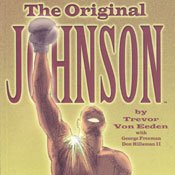Comic-book aficionados will likely remember Trevor Von Eeden for co-creating the character Black Lightning for DC Comics in the ‘70s. This was the first original African American character for the company, which boasts Batman and Superman in its repertoire.
Von Eeden spent the better part of 20 years drawing superheroes for DC and Marvel and then seemed to drop off the radar. So it was a surprise to come across his new graphic novel, the first of two that chronicle the life of Jack Johnson, America's first black heavyweight champion. "The Original Johnson: Volume One" (IDW Publishing, December 23, 2009, $19.99) by Von Eeden, with George Freeman and Don Hillsman II, is definitely a noteworthy return for the artist. The jump from working on major characters for the two biggest comic- book publishers to doing biographical comics almost sounds like a step backward in this industry. It might have been for another artist, but the story of Jack Johnson has clearly been a labor of love for the artist and now, writer.
Graphic novels, and comics in general, can sometimes result in tug of war between story and art. As a reader, I can sacrifice art for story, but not the reverse. While I was never a huge fan of Von Eeden's previously pedestrian superhero work, his less realistic and somewhat looser approach to the Jack Johnson story gives the boxer a larger than life, somewhat idealized presence that often seems out of step with the trend towards realism that dominates the superhero genre.
The slightly cartoony style lends itself to scenes of Johnson's fighting—from his early days of dock fighting, through the brutal time in matches featuring blindfolded fighters in a last-man-standing free-for-all, to his rise in the square circle. Just as boldly drawn are scenes from Jack Johnson's personal life before and during his career. In essence, Von Eeden's style suits the subject matter's full-bore approach to life in and out of the ring.
This is the story of one man, but a man who virtually represented an entire race of people and their aspiration to be seen as equals to, if not at times superior to, an oppressive belief that African Americans were, by default, inferior to whites. The book makes it clear that both black and white Americans had come to internalize this belief to the point that it permeated society well after the end of slavery. The example set by one man became an inspiration for a generation just learning what a measure of freedom could allow for.
Riding the rails to New York City as a young man, Johnson makes friends with a fellow vagabond who imparts a sense of the inequality of the times.
"It's all man-made, the feelings of worthlessness and inferiority! Made by other men to make a man into a tool—for their benefit, not his!" the man tells Johnson, perhaps helping spark the fire of perseverance that Johnson came to embody. Johnson learns from this older man that freedom by itself is useless without the will to act on it, and incorporates this into his quest to do what seemed impossible in a less than hospitable environment.
Johnson routinely encountered bigotry and the obstacles it places around someone who refuses to "know his place," from the same men who profited from his prowess in the ring. As his mentor, "Jersey" Joe Walcott, phrased it, "The goal of fightin' is never just to hurt your opponent. It's to win! It's to thrive! It's to enjoy the fact of your bein' alive!"
In the end, it's Johnson's love for living and the sport and craft of boxing coupled with his belief in his own self-worth that drives him toward becoming the man who would redefine all previous notions white America clung to regarding their superiority.
The book is surprisingly well written; Von Eeden may have trumped his artistic skills. At times his writing style becomes lyrical, particularly during a dream sequence—"His enemies were legion, beyond counting, and his heart was light as he leapt into battle"—but he manages not to veer off into overly florid prose.
And while the subject matter is rife with the ups and downs of Johnson's life, and his struggles with white society, the story moves along at an easy pace without falling into preachiness in regard to rising above the inherent hardships of being essentially a second class citizen.
It makes for an interesting and dramatic read about a true American hero who refused to accept what was offered and gained more than was thought possible. As Johnson himself states: "My hands ... these hands ... with these hands, I can do anything ... haha ... yeah, I can change the world."
"The Original Johnson: Volume One" is the first of a two volume set with the second volume to be released this month. As it stands, the first volume is an engaging tale of America's first African American heavyweight champion, and a stark reminder of this country's less-than-stellar treatment of some of its own citizens in the early part of the 20th century. A bit of a history lesson at times, but enjoyably so, "The Original Johnson" offers an interesting look at a man who faced down prejudice and emerged a better person, and a champion for more than just fans of boxing.
"The Original Johnson Volume One" is available at Action Island Comics in Ridgeland, Van's Comics and Cards in Ridgeland, and Heroes and Dreams in Flowood.



Comments
Use the comment form below to begin a discussion about this content.